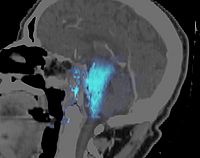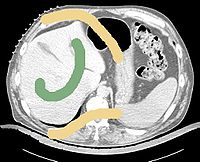Difference between revisions of "Autoseg 2015"
| Line 1: | Line 1: | ||
[[image:autoseg_2015_brainstem.jpg|right|200px]] | [[image:autoseg_2015_brainstem.jpg|right|200px]] | ||
[[image:autoseg_2015_growcut.jpg|right|200px]] | [[image:autoseg_2015_growcut.jpg|right|200px]] | ||
| + | |||
== Introduction == | == Introduction == | ||
| − | + | We are pleased to announce the Autoseg 2015 Workshop being held on June 7, 2015 in conjunction with the IUPESM 2015 World Congress on Medical Physics & Biomedical Engineering (http://wc2015.org) at the Metro Toronto Convention Centre in Toronto, Canada. | |
| − | + | == Learning Objectives == | |
| + | |||
| + | This program will focus on automated methods for medical image segmentation. Topics will include clinical applications, algorithms, and computational implementation. Medical physicists, biomedical engineers, imaging scientists, computer scientists and healthcare professionals who use autosegmentation methods will enhance their knowledge and skills by attending this one-day event. | ||
| + | |||
| + | After this event, attendees will be able to describe several autosegmentation algorithms; compare and evaluate different autosegmentation techniques; and select amongst different algorithms for varied imaging modalities and tasks. | ||
| + | |||
| + | The workshop will consist of ten invited presentations from leaders in medical image autosegmentation and provides the opportunity for medical imaging researchers to meet and exchange ideas in the rapidly advancing field of automatic segmentation. | ||
== Organizing Committee == | == Organizing Committee == | ||
| − | Stephen Breen, Princess Margaret Cancer Centre<br> | + | Stephen Breen, Princess Margaret Cancer Centre, Canada<br> |
| − | Vladimir Pekar, Philips Healthcare<br> | + | Vladimir Pekar, Philips Healthcare, Canada<br> |
| − | Gregory Sharp, Massachusetts General Hospital | + | Gregory Sharp, Massachusetts General Hospital, USA |
== Speakers == | == Speakers == | ||
| Line 23: | Line 30: | ||
Prabhjot Juneja, University of Sydney, Australia<br> | Prabhjot Juneja, University of Sydney, Australia<br> | ||
Grigorios Karangelis, Oncology Systems Ltd, United Kingdom<br> | Grigorios Karangelis, Oncology Systems Ltd, United Kingdom<br> | ||
| + | |||
| + | == Participation == | ||
| + | The workshop is free and open to the public. No prior registration is necessary. | ||
| + | |||
| + | == CAMPEP Credits == | ||
| + | The organizing committee has applied to CAMPEP for the approval of this activity for 7 hours of Medical Physics Continuing Education Credits. | ||
== Venue == | == Venue == | ||
| Line 32: | Line 45: | ||
Toronto, Canada | Toronto, Canada | ||
| − | + | The organizing committee acknowledges the financial support from COMP.<br> | |
| − | The | + | |
| + | [[image:comp_logo.png|300px]]<br> | ||
Revision as of 14:25, 31 March 2015
Home < Autoseg 2015Contents
Introduction
We are pleased to announce the Autoseg 2015 Workshop being held on June 7, 2015 in conjunction with the IUPESM 2015 World Congress on Medical Physics & Biomedical Engineering (http://wc2015.org) at the Metro Toronto Convention Centre in Toronto, Canada.
Learning Objectives
This program will focus on automated methods for medical image segmentation. Topics will include clinical applications, algorithms, and computational implementation. Medical physicists, biomedical engineers, imaging scientists, computer scientists and healthcare professionals who use autosegmentation methods will enhance their knowledge and skills by attending this one-day event.
After this event, attendees will be able to describe several autosegmentation algorithms; compare and evaluate different autosegmentation techniques; and select amongst different algorithms for varied imaging modalities and tasks.
The workshop will consist of ten invited presentations from leaders in medical image autosegmentation and provides the opportunity for medical imaging researchers to meet and exchange ideas in the rapidly advancing field of automatic segmentation.
Organizing Committee
Stephen Breen, Princess Margaret Cancer Centre, Canada
Vladimir Pekar, Philips Healthcare, Canada
Gregory Sharp, Massachusetts General Hospital, USA
Speakers
John Kim, Princess Margaret Cancer Centre, Canada
Stina Svensson, Raysearch Laboratories, Sweden
Jinzhong Yang, MD Anderson Cancer Center, USA
Thomas Langerak, Erasmus Medical Center, The Netherlands
Chris McIntosh, Princess Margaret Cancer Centre, Canada
Harini Veeraragavan, Memorial Sloan Kettering Cancer Center, USA
Yuri Boykov, Western University, Canada
Satish Viswanath, Case Western University, USA
Prabhjot Juneja, University of Sydney, Australia
Grigorios Karangelis, Oncology Systems Ltd, United Kingdom
Participation
The workshop is free and open to the public. No prior registration is necessary.
CAMPEP Credits
The organizing committee has applied to CAMPEP for the approval of this activity for 7 hours of Medical Physics Continuing Education Credits.
Venue

Held in conjunction with http://wc2015.org/
June 7, 2015, 8:00-13:30
Metro Toronto Convention Center
Toronto, Canada
The organizing committee acknowledges the financial support from COMP.


